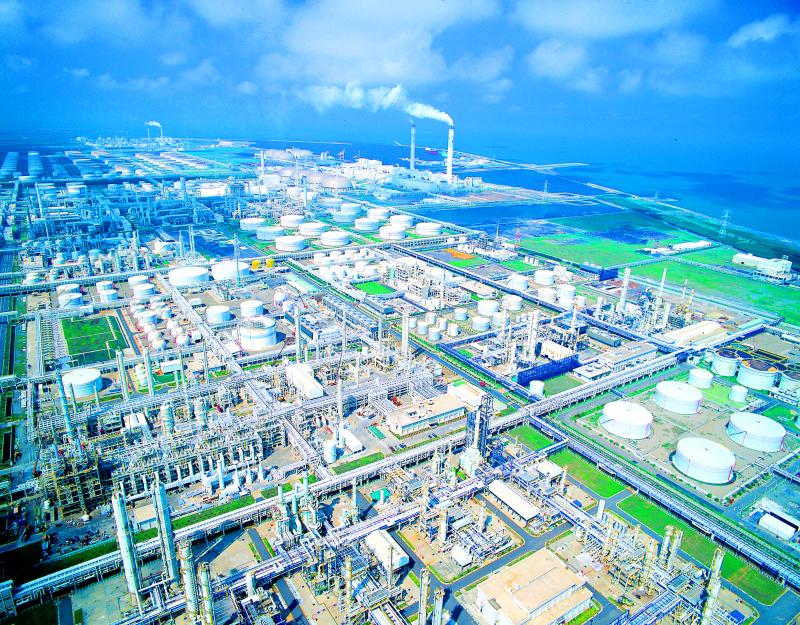Formosa Plastics Group’s (FPG, 台塑集團) four major subsidiaries yesterday posted monthly declines in revenue of more than 10 percent last month, and said the weakness would likely remain throughout this quarter as macroeconomic uncertainty continues to curb demand.
Petrochemical producer Formosa Plastics Corp (FPC, 台塑), the group’s flagship company, saw revenue tumble 16.7 percent month-on-month to NT$19.94 billion (US$664.76 million) as inflation and rising inventory in the supply chain curtailed demand for home appliances and consumer electronics, the firm said in a filing with the Taiwan Stock Exchange.
As central banks worldwide raise interest rates to rein in rising inflation, their actions have reduced disposable income and weakened purchasing power, which has in turn affected demand for FPC’s products and undercut its product prices.

Photo: Taipei Times File Photo
Prices of FPC’s products dropped 5 to 10 percent last month from June, according to its filing.
“As market demand became conservative, the company maintains its forecast for revenue in the third quarter to be lower than in the second quarter,” FPC chairman Jason Lin (林健男) said.
The firm also expects lower production this quarter as it has idled some equipment to match Formosa Petrochemical Corp’s (台塑石化) regular equipment maintenance, Lin said.
Formosa Petrochemical, the group’s oil refining subsidiary, reported that revenue last month fell 13.4 percent monthly to NT$76.59 billion due to sluggish demand for olefin products, a type of chemical that includes ethylene and propylene, and fewer refining oil shipments due to delays in shipping schedules.
The firm said that outlook for this month would improve slightly as a reduction in output by major oil producers provides support to global crude oil prices.
Nan Ya Plastics Corp (南亞塑膠), another FPG subsidiary, reported that revenue last month dropped 13 percent monthly to NT$27.97 billion, in line with the firm’s estimate.
Nan Ya attributed the decline to a significant reduction in ethylene glycol production as it aimed to narrow losses, while the company shipped less bisphenol A last month, and prices dipped from June due to excessive inventory, it said.
Revenue this month is expected to rebound slightly from last month, but revenue for this quarter would be lower than that in the previous quarter, the company said.
Formosa Chemicals and Fibre Corp (台灣化纖), another FPG subsidiary, said revenue fell 14.3 percent month-on-month to NT$31.25 billion due to drops in demand and prices.
The maker of integrated plastic and nylon products expects revenue this quarter to decline from last quarter, with shipments and prices to decline significantly, it said.

With an approval rating of just two percent, Peruvian President Dina Boluarte might be the world’s most unpopular leader, according to pollsters. Protests greeted her rise to power 29 months ago, and have marked her entire term — joined by assorted scandals, investigations, controversies and a surge in gang violence. The 63-year-old is the target of a dozen probes, including for her alleged failure to declare gifts of luxury jewels and watches, a scandal inevitably dubbed “Rolexgate.” She is also under the microscope for a two-week undeclared absence for nose surgery — which she insists was medical, not cosmetic — and is

CAUTIOUS RECOVERY: While the manufacturing sector returned to growth amid the US-China trade truce, firms remain wary as uncertainty clouds the outlook, the CIER said The local manufacturing sector returned to expansion last month, as the official purchasing managers’ index (PMI) rose 2.1 points to 51.0, driven by a temporary easing in US-China trade tensions, the Chung-Hua Institution for Economic Research (CIER, 中華經濟研究院) said yesterday. The PMI gauges the health of the manufacturing industry, with readings above 50 indicating expansion and those below 50 signaling contraction. “Firms are not as pessimistic as they were in April, but they remain far from optimistic,” CIER president Lien Hsien-ming (連賢明) said at a news conference. The full impact of US tariff decisions is unlikely to become clear until later this month

GROWING CONCERN: Some senior Trump administration officials opposed the UAE expansion over fears that another TSMC project could jeopardize its US investment Taiwan Semiconductor Manufacturing Co (TSMC, 台積電) is evaluating building an advanced production facility in the United Arab Emirates (UAE) and has discussed the possibility with officials in US President Donald Trump’s administration, people familiar with the matter said, in a potentially major bet on the Middle East that would only come to fruition with Washington’s approval. The company has had multiple meetings in the past few months with US Special Envoy to the Middle East Steve Witkoff and officials from MGX, an influential investment vehicle overseen by the UAE president’s brother, the people said. The conversations are a continuation of talks that

CHIP DUTIES: TSMC said it voiced its concerns to Washington about tariffs, telling the US commerce department that it wants ‘fair treatment’ to protect its competitiveness Taiwan Semiconductor Manufacturing Co (TSMC, 台積電) yesterday reiterated robust business prospects for this year as strong artificial intelligence (AI) chip demand from Nvidia Corp and other customers would absorb the impacts of US tariffs. “The impact of tariffs would be indirect, as the custom tax is the importers’ responsibility, not the exporters,” TSMC chairman and chief executive officer C.C. Wei (魏哲家) said at the chipmaker’s annual shareholders’ meeting in Hsinchu City. TSMC’s business could be affected if people become reluctant to buy electronics due to inflated prices, Wei said. In addition, the chipmaker has voiced its concern to the US Department of Commerce